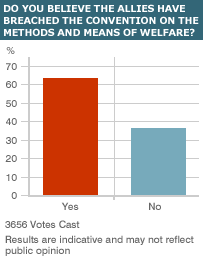(this is getting to be a habit), study this BBC Views Online article from 20:18 last night, ‘Santa’ party girl dies in crash, then complete the following sentence:
The passenger is described by police as ______, 6ft 3ins tall. The driver is also believed to be ______.
Clue: See this Times article, Girl, 5, dies in hit-and-run after Christmas party, which, unlike BBC Views Online, passes on the Police description of the suspects without the BBC’s censorship.
Update: Since I wrote this post last night a subsequent BBC article was published at 05:27, Grief over hit-and-run death girl, that doesn’t censor the police descriptions. The PC cretin that wrote the first article ought to have their backside kicked – but I doubt anyone at the BBC believes in backside-kicking, metaphorical or otherwise, these days.


